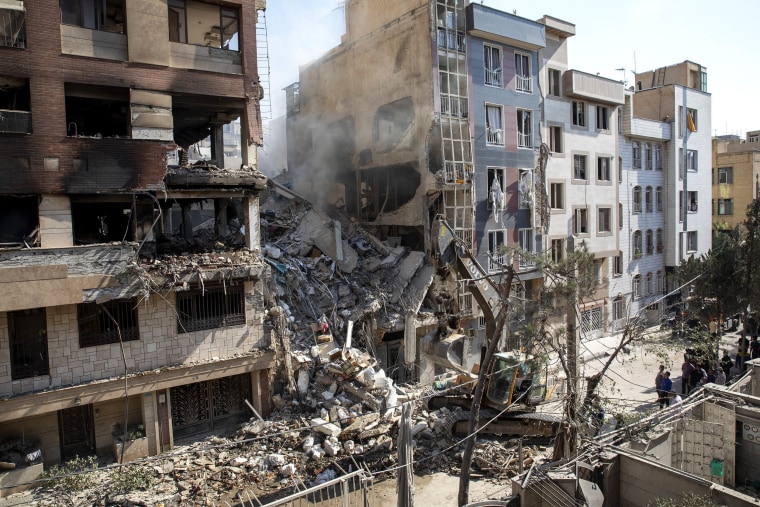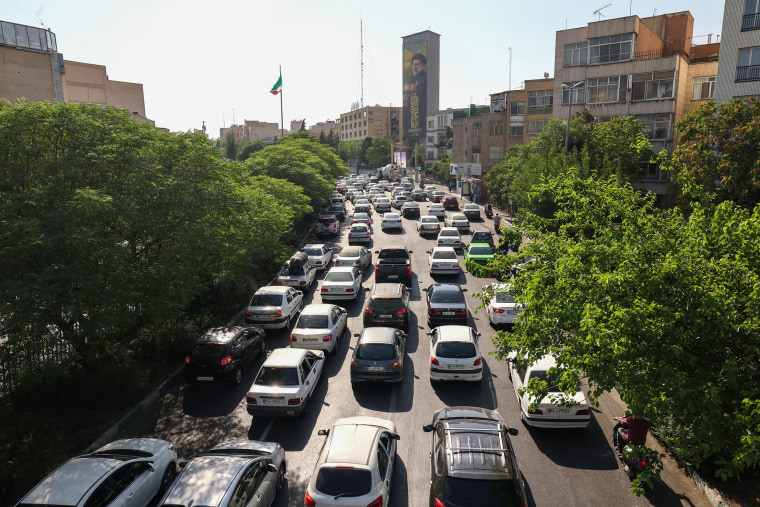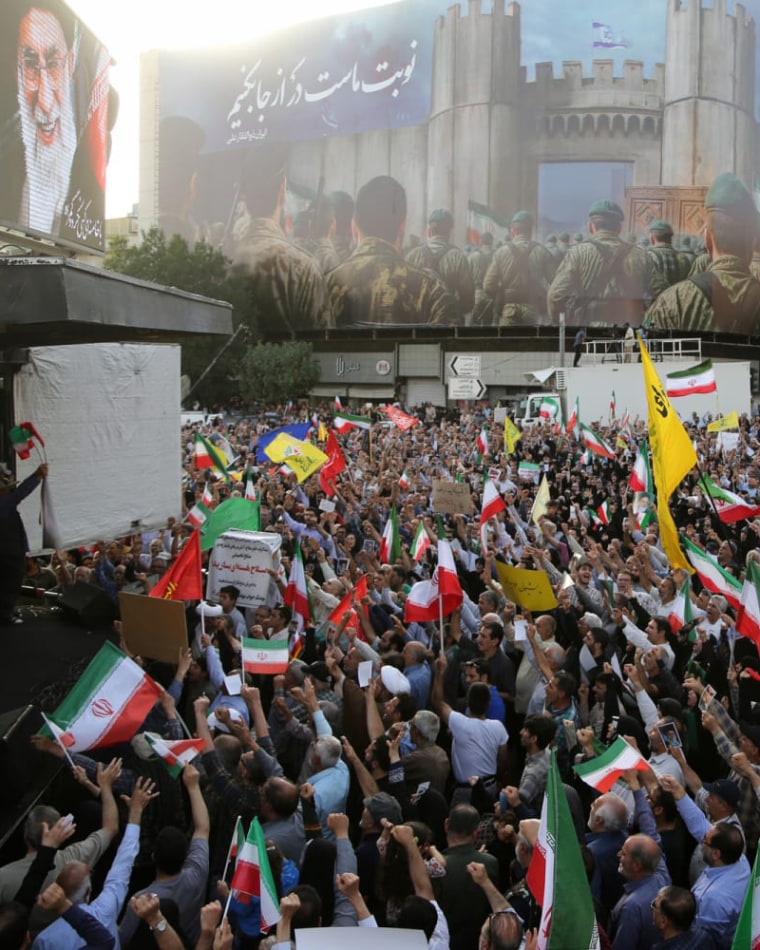The Iranian people deserve better than the current despotic theocracy that governs the country and shows utter contempt for the freedom of its people. Yet, when President Donald Trump began posting online — mere hours after the United States initiated a bombing campaign on Iranian nuclear sites Saturday — that “regime change” might be on the table, I heard dread from inside and outside the country. Not because Iranians don’t welcome the end of the totalitarian regime. But at the quixotic notion the U.S. believes that bombs bring democracy, or that it has the right — through what could end up being another forever war — to deliver what it calls peace for the Iranian people.
Iranians are not waiting around to be saved by a Western power — they want to, and will, emancipate themselves.
A U.S. and Qatar-negotiated ceasefire between Israel and Iran was announced by Trump on Monday. If it maintains, it’s a temporary relief for the Iranian people, who are dismayed at being caught in the crosshairs of a conflict between their country’s dictatorship and the aggressive actions of the Israeli government. There are also fears that the regime, bruised but not beaten, will take its ire out on innocent citizens to ensure there’s no possibility of widespread dissent, like we saw in 2022’s "Woman, Life, Freedom" movement.
However, some Iranians, while expressing that sentiment, have also cautiously celebrated the hits against Islamic Revolutionary Guard Corps and military targets — seeing them as strikes against the oppressive regime. Many, many others, including revered opposition activists like Nobel laureate Narges Mohammadi, called for an immediate ceasefire and diplomacy.
The mixed reactions make sense. Iranians are not a monolith.
A consistent refrain, however, rings out from inside and outside Iran across its sizable diaspora: Iranians are not waiting around to be saved by a Western power — they want to, and will, emancipate themselves, even though the tentacles of the regime are long and 46 years enduring.
There are some hopes from inside Iran — across messages I’ve seen when the intermittent internet in the country has been working — that this might be the moment the regime falls. There’s even hopes that Israel — and now the U.S. — could tip the balance with targeted military strikes and decisively dismantling the apparatus of the regime. (There is no naivety, however, that the Israeli or U.S. governments have any deep care or interest about what happens to the Iranian people.)
But there are also deep, anguished concerns of civilian harms, as they see bombs rain down on their cities, that an American-backed effort to spearhead regime change that fails would result in a doubling down of draconian measures by the Islamic Republic to retain power and further suppress dissent.
There are 92 million people in Iran, the majority of whom (77% roughly) live in urban, built-up areas. There are Persians, Kurds, Baluchis, Turkic groups and all manner of diverse ethnic backgrounds. While the official religion of the country is officially Shia Muslim, there are also more Jews in Iran than any other country in the Middle East outside of Israel.
Cities are densely populated and, to date, nearly 400 civilians have been killed as a result of Israel’s latest strikes on Iran, with many more injured, according to the Human Rights Activists News Agency (HRANA), a U.S.-based nongovernmental organization that advocates for human rights in Iran.

Iranian people have no love for the oppressive, theocratic regime which has had a stranglehold over the country since the 1979 Islamic Revolution. The laundry list of ills the regime has perpetuated against the Iranian people is so long — from physical, psychological, financial, cultural — that it’s hard to put it down on paper, for fear of inadvertently omitting another heinous act of barbarism.
The regime is responsible for extrajudicial killings. For targeting, imprisoning and killing journalists. For shooting women in the breasts and genitals in retaliation for taking to the streets during the 2022 Woman, Life, Freedom uprisings. For killing and torturing political prisoners. For downing a passenger plane and killing all 176 people on board.
For imprisoning anyone who dares dissent. In the eyes of the regime, dissent can be found everywhere, and punishment is meted out in the form of cultural protest, as we’ve seen with the repeated imprisonment of cultural figures such as filmmaker Jafar Panahi, rapper Toomaj Salehi and poet Sepideh Rashno.
Iranian people have no love for the oppressive, theocratic regime which has had a stranglehold over the country since the 1979 Islamic Revolution.
Official polling is hard to conduct inside Iran, because the Islamic Republic doesn’t allow for freedom of expression or political dissent. Fear of reprisals is extremely high. But a poll conducted by The Group for Analyzing and Measuring Attitudes in IRAN (GAMAAN) — which lists its extensive methodology and the ways it attempted to gather accurate responses from more than 16,000 Iranian adults — found that an overwhelming majority of Iranians agreed with demonstrations against the regime in 2022.
And Iranians inside Iran overwhelmingly favored a complete change in government, with 83% of respondents between the ages of 20-29 stating they wanted regime change over mere reforms.
Of course, Israeli Prime Minister Benjamin Netanyahu didn’t use any of this as explicit justification for Israel’s strikes on Iran this month. But while Bibi didn’t use regime change as initial justification for his strikes against Iran, later, per the Times of Israel, he stated that “the Jewish state might free the Persians” adding that “they [Iranian people] have to rise up themselves, but we are creating the conditions.”
There is widespread agreement that, in general, the non-hyperreligious Iranian population would prefer better ties to the West and ideally be rid of the regime, with a new self-determined government. The diaspora reflects that, with some disagreement on who that new government should or could be.
But that doesn’t mean Iranians would benefit from a U.S.-led “liberation” by force.

Specifically, America’s track record of Middle East regime change has been bloody and dotted with failure. And the U.S. has a notably dire record attempting Iranian regime change, specifically.
A CIA-backed coup resulted in the overthrow of the democratically elected nationalist PM Mohammad Mossadegh in 1953, disastrous meddling that ultimately helped hasten the regime’s existence into being two decades later. And then there’s the role the Carter administration had in setting the stage for Ayatollah Khomeini’s return to Iran from exile, and establishing the Islamic Republic in 1979.
A great many Iranians include some of the world’s biggest cultural Americanophiles, and they roll their eyes at the largely ridiculous “death to America” chants by pro-regime hard-liners (even though right-wingers outside Iran can’t get enough of such images). But even the most pro-American Iranians have long considered the U.S. government to be an untrustworthy, imperialist, self-centered entity.
The people of Iran are powerful, with a resilience only matched by their continual ability to crack jokes and deploy the most brilliant sarcasm even in the bleakest of times, as evinced from the messages I’ve received on encrypted channels since this latest ratcheting between Israel and Iran. But this latest salvo is a test of the most enduring — and charismatic — people, who yearn for freedom, dignity and peace.
And the cruel dichotomy for Iranians is a deep desire for change, but facing the reality that rarely is a democratic system of government delivered through a foreign-led bombing campaign with any enduring success.
